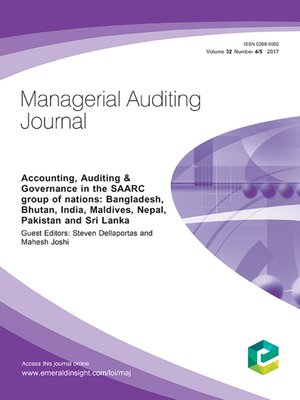Managerial Auditing Journal, Volume 32, 4/5/2017
ebook ∣ Accounting, Auditing & Governance in the SAARC group of nations: Bangladesh, Bhutan, India, Maldives, Nepal, Pakistan and Sri Lanka · Managerial Auditing Journal
By Mahesh Joshi

Sign up to save your library
With an OverDrive account, you can save your favorite libraries for at-a-glance information about availability. Find out more about OverDrive accounts.
Find this title in Libby, the library reading app by OverDrive.



Search for a digital library with this title
Title found at these libraries:
| Library Name | Distance |
|---|---|
| Loading... |
This ebook on 'Accounting in SAARC' was conceptualised to explore the deeper structures of accounting and auditing practices in seven countries of South Asia inclusive of: Bangladesh, Bhutan, India, Maldives, Nepal, Pakistan and Sri Lanka. This group of counties represents one of the world's largest population zones with close territorial, historical, social and economic proximity. This geographic zone is dense in population and has emerged as a thriving export and import hub for global business. Despite burgeoning economic activity, global integration from many perspectives has yet to evolve. Financial reporting, audit quality and corporate governance represent one such area where full global integration is evolving. This ebook gives a voice to accounting and auditing researchers who are located in, or have an interest in this community. Managerial Auditing Journal (MAJ) reached out to researchers from the seven SAARC group of countries and sought contributions in their respective areas of expertise and country specific expertise. The special issue sought and received contributions comprised of a wide of topics including: the historical development of accounting and/or the profession; the role of professional accounting bodies in the development of accounting; financial reporting, integrated reporting, accounting standards, regulation and taxation; a critical analysis of financial reporting; accounting in a cultural context; integrated reporting; internal and external auditing; corporate governance mechanisms to improve financial, environmental and social performance; management accounting and controls; the role of accounting education to inspire a new generation of accountants; accounting and accountability issues in the public sector, NGOs, multinational corporations and family businesses.







